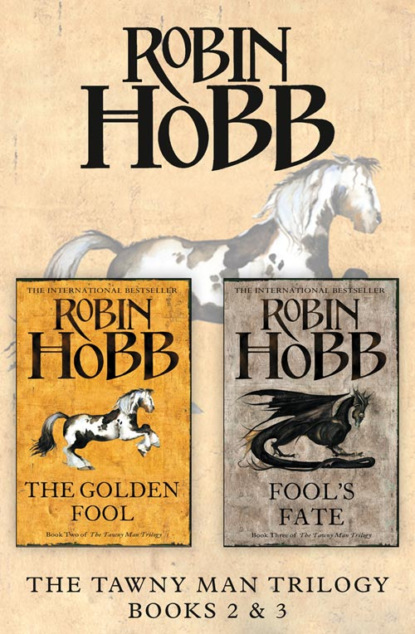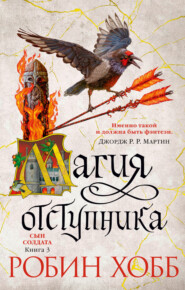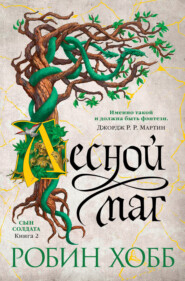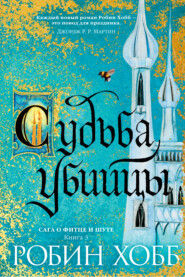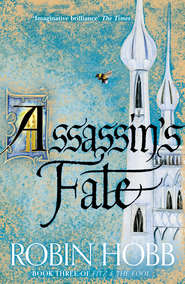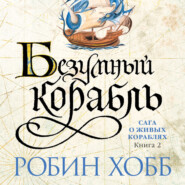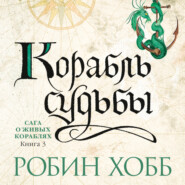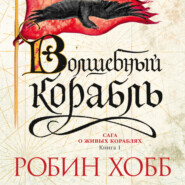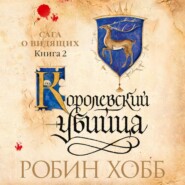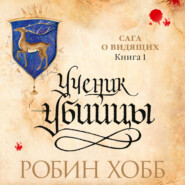По всем вопросам обращайтесь на: info@litportal.ru
(©) 2003-2024.
✖
The Tawny Man Series Books 2 and 3: The Golden Fool, Fool’s Fate
Автор
Год написания книги
2018
Настройки чтения
Размер шрифта
Высота строк
Поля
‘But change proves that you are still alive. Change often measures our tolerance for folk different from ourselves. Can we accept their languages, their customs, their garments, and their foods into our own lives? If we can, then we form bonds, bonds that make wars less likely. If we cannot, if we believe that we must do things as we have always done them, then we must either fight to remain as we are, or die.’
‘That’s cheery.’
‘It’s true,’ the Fool insisted. ‘Bingtown just went through such an upheaval. Now they war with Chalced, mostly because Chalced refuses to recognize the need for change. And that war may spread to include the Six Duchies.’
‘I doubt it. I don’t really see where it has anything to do with us. Oh, our southern duchies will jump into the fray, but only because they have always relished the conflict with Chalced. It’s a chance to carve away a bit more of their territory and make it ours. But as far as the whole Six Duchies engaging … I doubt it.’
I shrugged into the Jamaillian doublet and buttoned it. It had far more buttons than it needed. It fitted tightly to my waist, with skirt-like panels that reached nearly to my knees. ‘I hate dressing in Jamaillian clothing. And how am I to reach my knife if I need it?’
‘I know you. If you need it, you’ll find a way to reach it. And I assure you, in Jamaillia you’d be at least three years out of date. In Jamaillia, they’d assume you were a provincial from Bingtown, attempting to dress like a Jamaillian. But it’s enough. It reinforces the myth that I am a Jamaillian nobleman. If my clothing looks exotic enough, folk accept the rest of me as normal.’ He stood up. His right foot wore an embroidered dancing slipper. The left was bound as if his ankle needed support. He took up a carved walking stick. I recognized it as the work of his own hands; to anyone else, it would seem extravagantly expensive.
Tonight, we were purple and white. Rather like turnips, I thought to myself savagely. Lord Golden’s garments were far more elaborate and showy than mine were. The cuffs of my striped shirt were loose at the wrist, but his were dagged and extended past his hands. His shirt was white, but the purple Jamaillian doublet that snugged his chest had embroidered skirts that glittered with thousands of tiny jet beads. Rather than the trousers of a servant, he wore silk leggings. He had chosen to let his hair fall loose to his shoulders in long ringlets of gleaming gold. I had no idea what he had put on his hair to persuade it to such excess. And as I had heard some Jamaillian nobles did, he had painted his face, a scale-like pattern of blue above his brows and across the tops of his cheeks. He caught me staring at him. ‘Well?’ he demanded, almost uneasily.
‘You’re right. You’re a very convincing Jamaillian lord.’
‘Then let us descend. Bring my footstool and cushion. We’ll use my injury as an excuse for arriving early in the Great Hall and watching the others come in.’
I picked up his stool in my right hand and tucked the cushion for it under my right arm. My left I offered to him as he affected a very convincing hobble. As always, he was a consummate actor. Perhaps because of the Skill-bond between us, I was aware of the keen pleasure he took in such dissembling. Certainly, it did not show in his demeanour as he grumbled and rebuked me for clumsiness all the way down the stairs.
A short distance from the immense doors that led to the Great Hall, we paused briefly. Lord Golden appeared to be catching his breath as he leaned heavily on my arm, but the Fool spoke closely by my ear. ‘Don’t forget you’re a servant here now. Humility, Tom Badgerlock. Regardless of what you see, don’t look at anyone in a challenging way. It wouldn’t be proper. Ready?’
I nodded, thinking I scarcely needed his reminder, and tucked his cushion more firmly under my arm. We entered the Great Hall. And here, too, I encountered change. In my boyhood, the Great Hall had been the gathering place for all of Buckkeep. Near that hearth I had sat to recite my lessons to Fedwren the scribe. As often as not, there would have been other gatherings at the other hearths throughout the hall: men fletching arrows, women embroidering and chatting, minstrels rehearsing songs or composing new ones. Despite the roaring hearths and the serving boys who fetched wood for them, the Great Hall was always, in my memories, slightly chill and dank. The light never seemed to reach to the corners. In winter, the tapestries and banners that draped the walls retreated into dimness, a twilight interior night. For the most part, I recalled the cold flagged floor as being strewn with rushes, prone to mildew and damp. When the boards were set for meals, dogs sprawled beneath them or cruised amongst the benches like hungry sharks awaiting a tossed bone or dropped crust. It had been a lively place, noisy with the tales of warriors and guardsmen. King Shrewd’s Buckkeep, I thought to myself, had been a rough and martial place, a castle and keep before it was a king’s palace.
Was it time or Queen Kettricken that had changed it so?
It even smelled different, less of sweat and dogs, more of burning applewood and food. The dark that the hearth fires and candles had never been able to disperse had yielded, albeit grudgingly, to the overhead candelabra suspended by gilded chains over the long blue-clothed tables. The only dogs I saw were small ones, temporarily escaped from a lady’s lap to challenge another feist or sniff about someone’s boots. The reeds underfoot were clean and backed by a layer of sand. In the centre of the room a large section of the floor was bared sand, swept into elaborate designs that would soon fall prey to the dancers’ tread. No one was seated at the tables, yet there were already bowls of ripe fruit and baskets of fresh bread upon them. Early guests stood in small groups or sat in chairs and on cushioned benches near the hearths, the hum of their conversations mingling with the soft music of a single harper on a dais near the main fire.
The entire room conveyed a carefully constructed sense of waiting. Rows of standing torches lit the tiered high dais. Their brightness drew the eye, the light as much as the height proclaiming the importance of those who would be seated there. On the highest level, there were throne-like chairs for Kettricken and Dutiful and Elliania and two others. The slightly humbler but still grand chairs of the second dais would be for the dukes and duchesses of the Six Duchies who had gathered to witness their prince’s betrothal. A second dais of equal height had been provided for Elliania’s nobles. The third dais would be for those who were high in the Queen’s regard.
Almost as soon as we entered the Great Hall, several lovely women broke away from the young noblemen they had been talking to and converged on Lord Golden. It was rather like being mobbed by butterflies. Gauzy wraps seemed to be the fashion, an imported foolishness from Jamaillia that offered no sort of warmth in the permanent chill of the Great Hall. I studied the goosebumps on the arms of Lady Heliotrope as she sympathized with Lord Golden. I wondered when Buckkeep had become so avid for these foreign styles of dress and grudgingly admitted that I resented the changes I saw around me, not only because they eclipsed more and more of the Buckkeep I remembered from my childhood, but also because they made me feel stodgy and old. Cooing and clucking over his injured foot, the women escorted Lord Golden to a comfortable chair. I assisted him obediently there, set his footstool in place, the cushion upon it. Young Lord Oaks reappeared and with a firm, ‘Let me do that, man,’ insisted on helping Lord Golden position his foot upon it.
I stepped aside, lifted my eyes and seemed to glance past a group of Outislanders who had just entered. They moved almost as a phalanx of warriors might, entering the hall as a compact group. Once within the hall, they did not disperse but kept to their own. They reminded me of the Outisland warriors I had fought on Antler Island, so long ago. The men wore not only their furs and leather harness but some of the older men flaunted battle trophies: necklaces of fingerbones, or a braid dangling at the hip that was made from locks of hair taken from vanquished foes. The women among them moved as dauntlessly as their men. Their robes were woven of wool, richly dyed, and trimmed with white fur only: fox, ermine and tufts of ice bear.
Outislander women were not likely to be warriors; they were the landowners among their folk. In a culture in which the men often wandered off to spend years as raiders, the women were more than the caretakers of the land. Houses and farmlands were passed from mothers to daughters, as was the family’s wealth in the forms of jewellery and ornaments and tools. Men might come and go in the women’s lives, but a daughter kept always her ties to her mother’s house, and a man’s connection to his mother’s home was stronger and more permanent than his marriage bonds. The woman determined how binding the marriage yoke was. If a man was overly long away at his raiding, she might take another husband or a lover in his absence. As children belonged to the mother and the mother’s family, it little mattered who had fathered them. I studied them, knowing they were not nobles and lords in the sense that we used those titles. More likely the women owned substantial land and the men had distinguished themselves in battle and raiding.
As I watched the Outislander delegation, I wondered if change had come to their lands as well. Their women had never been chattels of their men. The men might traffic in the women and youngsters dragged home as the trove of their raiding, but their own women were immune to such bargains. How strange was it, then, for a father to have the right to offer his daughter as a token to secure peace and trade? Did Elliania’s father truly offer her? Or was her presence here a ploy of an older, more powerful family: her mother’s kin? Yet if that were so, why hide it? Why let it appear that her father was offering her? Why was Peottre the sole representative of their motherhouse?
And all the while I was watching the Outislanders, I listened with half an ear to the chattering of the women who surrounded Lord Golden. Two, Lady Heliotrope and Lady Calendula, had been in his rooms earlier. I now deduced they were sisters as well as rivals for his attention. The way that Lord Oaks constantly managed to stand between Lady Calendula and Lord Golden made me wonder if he did not desire her attention for himself. Lady Thrift was older than the other women, and perhaps older than I. I suspected she had a husband somewhere about Buckkeep. She sported the matronly aggression of a woman who was securely married yet still relished the thrill of the pursuit, rather like some foxhunters I have known. It was not that she had any need for her prey, but rather that she liked to prove she could unerringly bring it down even when pitted against the sharpest competition. Her gown bared more of her breasts than was seemly, but it did not seem as brazen as it might have in a younger woman. She had a way of setting her hand to Lord Golden’s arm or shoulder that was almost possessive. Twice I saw him capture the hand touching him, pat it or give it a squeeze and then carefully release it. She probably felt flattered, but to my eye it looked more as if he plucked lint from his sleeve.
Lord Lalwick, a pleasant-faced man of middle years, drifted over to join those clustered about Lord Golden. He was a tidily-dressed man of gentle manner who made a point of introducing himself to me, a rare courtesy to show to a servant. I smiled as I bowed to his greeting. He bumped against me several times as he jockeyed to get closer to Lord Golden and the conversation, but it was easy to excuse his clumsiness. Each time I begged his pardon and stepped back only to have him smile and warmly assure me that it was entirely his own fault. The conversation centred upon poor Lord Golden’s injured ankle and how rough the unsympathetic healer had been and how devastated they all were that he could not join them upon the dance floor. Here Lady Thrift stole a march upon her competitors, declaring as she took up Lord Golden’s hand that she would keep him company while ‘you girls dance with your suitors’. Lord Lalwick immediately declared that he would be happy to keep Lord Golden company, for he himself was a poor dancer. When Lord Golden assured him that he knew such a statement was false modesty and that he would never dream of depriving the Buckkeep ladies of such a graceful partner, the man looked torn between disappointment at his dismissal and gratitude for the compliment.
Before the rivalry amongst the ladies could escalate any further, the minstrel suddenly stopped his harping. A page-boy beside him had evidently cued him, for the minstrel arose and, in a trained voice that filled the Great Hall and overrode all conversation, announced the entrance of Queen Kettricken Farseer and Prince Dutiful, heir to the Farseer throne. At a gesture from Lord Golden, I offered him my arm to help him stand. A hush fell and all eyes turned towards the doors. The folk near the entry pressed back into the crowd to allow a walking space between the doors and the high dais.
Queen Kettricken entered with Prince Dutiful at her right hand. She had learned much in the years since I had last seen her make such an entrance. I was unprepared for the sudden tears that stung my eyes, and I struggled valiantly to control the triumphant smile that threatened to take over my face.
She was magnificent.
An elaborate gown would only have distracted from her. She wore Buck blue with a contrasting trim of sable. The simple lines of her dress emphasized both her slenderness and her height. Straight as a soldier was she, yet also as supple as a wind-blown reed. The gleaming gold of her hair had been gathered in a braid that wreathed her head, with the excess spilling down her back. Her queen’s crown looked dull in comparison to those shining locks. No rings graced her fingers; no necklaces bound the pale column of her throat. She was queenly by virtue of who she was rather than what she wore.
Beside her, Dutiful was clad in a simple blue robe. It reminded me of how both Kettricken and Rurisk had been dressed the first time I had seen them. Then, I had mistaken the heirs of the Mountain Kingdom for serving people. I wondered if the Outislanders would see the plainness of Dutiful’s garb as humility or lack of wealth. He wore a simple silver band on his unruly black curls, for he was not yet old enough to wear the coronet of the King-in-Waiting. Until he was seventeen, he was simply a prince even though he was the sole heir. His only other ornamentation was a chain of silver trimmed with yellow diamonds. His eyes were as dark as his mother’s were pale. His looks were Farseer but the calm acceptance on his face was his mother’s Mountain schooling.
Queen Kettricken’s silent passage through her folk was both dignified and intimate, for the smile that lit her face as her eyes lingered on her assembled people was genuinely warm. Dutiful’s expression was grave. Perhaps he knew he could not smile without looking stricken. He offered his mother his arm as she ascended the stairs to the dais and they took their places at the table but were not seated. In a gracious yet carrying voice, Kettricken spoke. ‘Please, my people and friends, welcome to our Great Hall the Narcheska Elliania, a daughter of the Blackwater line of the God Runes Islands.’
I noted with approval that she gave Elliania not only the name of her mother’s line, but called her home by their name for the Outislands. Also, I noted that our queen had chosen to announce her rather than giving this task to the minstrel. As she gestured towards the open door, all eyes turned that way. The minstrel repeated the names of not only Elliania but also of Arkon Bloodblade, her father and Peottre Blackwater, her ‘mother’s brother’. The way he spoke the last phrase made me suspect it was one word in the Outislands and that he strove to give it that flavour. Then the Outislanders entered.
Arkon Bloodblade led the way. He was an imposing figure, his size enhanced by a bearskin cloak flung back over one shoulder. It was the yellow-white fur of an ice bear. His clothing was of woven cloth, a jerkin and trousers, but a leather vest and broad leather belt gave him an armoured, martial air despite his lack of weapons. He glittered with gold and silver and gems. He wore them at his throat and wrists, across his brow, in his ears. He wore bands of silver on his left upper arm, and bands of gold on his right. Some were studded with gems. His brash posture transformed his display of wealth into bragging gaudiness. His gait combined a sailor’s rolling stride with a warrior’s arrogant strut. I suspected I would dislike him. He scanned the room with a wide grin, as if he could not believe his good fortune. His eyes travelled across the waiting tables and gathered nobles and then lifted to where Kettricken awaited his company on the dais. His smile widened as if he glimpsed unclaimed plunder. I then knew that I already disliked him.
Behind him walked the Narcheska. Peottre escorted her, a pace behind her and to her right. He was dressed as simply as a soldier, in fur and leather. He wore earrings and a heavy torc of gold, but he seemed unaware of his jewellery. I marked that he took not just a guard’s place but also a guard’s attitude. His eyes roved the crowd watchfully. If there had been any in the crowd who wished the Narcheska ill and dared to act on it, he would have been ready to kill the attacker. Yet he gave off an aura not of suspiciousness but of quiet competence. And the girl walked before him, serene in the safety of the hulking man behind her.
I wondered who had selected her garments. Her short tunic was of snowy white wool. An enamelled pin, a leaping narwhal, secured her cloak at one shoulder. A panelled skirt of blue fell nearly to the floor. Glimpses of her feet as she walked revealed little white fur slippers. Her sleek black hair was caught in a silver clasp at the back of her head. From there it flowed down her back, an inky river. At intervals, tiny silver bells glittered in its current. Upon her brow she wore the coronet of silver set with one hundred sapphires.
Elliania set her own pace, a step, then a pause, and another step. Her father, unmindful of this, or perhaps ignorant of it, strode up to the dais, mounted it, and then was forced to stand at Queen Kettricken’s left, awaiting his daughter. Peottre matched the Narcheska’s gait calmly. The girl did not look straight ahead as she approached the high table, but turned her head to left or to right with each step. She looked intently at the people who met her gaze, as if to memorize each one. The small smile that graced her lips seemed genuine. It was an unnerving poise to witness in a child so young. The little girl who had been on the verge of a petulant tantrum when I had last seen her had been replaced by a presence who was, indeed, a queen in the bud. When she was two steps away from the dais, Dutiful descended it to offer her his arm. Here was the only moment when I saw her uncertain. She glanced at her uncle out of the corner of her eye, as if imploring that he offer her support instead. I do not know how he conveyed that she must accept the Prince’s gesture; I saw only her resignation as she carefully hovered her hand above his proffered arm. I doubted that she put a pressure equal to an alighting butterfly as she ascended the steps beside him. Peottre followed them, his tread heavy. He did not take a place before a chair, but rather stood behind the Narcheska’s. After the others were seated, it took a gesture and a quiet verbal invitation from the Queen before he took his seat.
Then the dukes and duchesses of the Six Duchies entered, each slowly crossing the hall and taking a place on the dais reserved for them. The Duchess of Bearns appeared first, her consort at her side. Faith of Bearns had grown into her title. I still recalled her as a slender maiden with a bloody sword in her hand, battling vainly to save her father’s life from Red Ship raiders. She wore her dark hair as short and sleek as ever. The man at her side was taller than she was and grey-eyed, pacing her with a warrior’s graceful stride. The bond between the two was a thing that could be felt, and I rejoiced that she had found happiness for herself.
Behind her came Duke Kelvar of Rippon, aged and crooked, one hand on a staff and one on his wife’s shoulder. Lady Grace had matured into a well-rounded woman of middle years. Her hand on top of her husband’s supported him in more ways than one. Both her gown and her jewels were simple, as if she finally felt confident of her stature as Duchess of Rippon. She matched her stride to his now-halting steps, her loyalty still strong to the man who had raised her from the peasantry to be his consort.
Duke Shemshy of Shoaks walked alone, widowed now. The last time I had seen him had been when he stood with Duke Brawndy of Bearns outside my cell in Regal’s dungeons. He had not condemned me, but neither had he thrown me a cloak for warmth as Bearns had. He still had hawk’s eyes and a slight stoop in his shoulders was his only concession to his years. He had entrusted his current war-making with Chalced to his daughter and heir while he took time to attend his prince’s betrothal.
Behind him walked Duke Bright of Farrow. He had matured since the days when Regal had foisted the defence of Buckkeep Castle onto his callow shoulders. He looked a man now. I had never seen his duchess. She looked half of his forty years, a fair and slender young woman who smiled warmly as she met the gazes of the lesser nobles who watched her ascend the dais. Finally came the Duke and Duchess of Tilth. Both were unfamiliar to me; the blood-cough had passed through Tilth three years before, and carried off not only the old duke, but also both his elder sons. I rummaged my memory for the name of the daughter who had inherited. Duchess Flourish of Tilth, the minstrel announced a moment later, and her consort, Duke Jower. Her nervousness made her appear younger than she was, and Jower’s hand over hers on his arm seemed to lead her as much as reassure her.
The dais reserved for the Outislander nobles and warriors who had accompanied the Narcheska awaited them. Grand entrances seemed a foreign custom to them, for they simply trooped up in a group and seated themselves as they pleased, with many exchanged grins and comments to one another. Arkon Bloodblade smiled down broadly upon them. The Narcheska seemed caught between loyalty to her folk and chagrin that they had not bothered to observe our customs. Peottre gazed out over their heads as if it did not concern him in the least. It was only as they were seated that I realized that these folk were Arkon’s, not Peottre’s. Each one bore, in some form or another, the image of a tusked boar. Arkon’s was wrought in gold upon his breast. One of the women had a tattoo on the back of her hand, and one man wore his boar as a bone carving on his belt. The motif did not appear anywhere upon the Narcheska nor on Peottre. I recalled the leaping narwhal I had seen embroidered on the Narcheska’s clothing the first time I had glimpsed her. This emblem secured her cloak again. A close study of Peottre’s garments revealed that a narwhal fastened his belt. I decided that the stylistic tattoo on his face could be considered suggestive of a narwhal’s horn. So, did we have two clans here, both offering the Narcheska? I decided that would bear looking into.
Those who filled the table at the foot of the high dais entered with less pageantry. Chade was among them, as was Laurel, the Queen’s Huntswoman. She was gowned in scarlet, and I was pleased to see her so well seated. I did not recognize the others, save for a final two. Starling, I suspected, had deliberately chosen to be the last to enter the Great Hall. She was resplendent in a green gown that reminded me of a hummingbird’s throat. She wore fine lacy gloves on her hands, as if to emphasize that tonight she was her queen’s guest rather than her minstrel. And one of those gloved hands rested on the muscular forearm of the man who escorted her. He was a fine-looking young fellow, fit of body and open of countenance. His pride in his wife was evident in his beaming smile and the way he escorted her. It seemed to me that he displayed her on his arm as a falconer might hold aloft a fine bird. I looked at the youngster I had unwittingly cuckolded, and felt shame enough for both Starling and myself. She was smiling, and as they passed before us, she deliberately met my gaze. I shifted my eyes and stared past her as if I knew her not at all. He knew nothing of me, and I wished to keep it that way. I did not even wish to know his name, but my traitor ears marked it anyway. Lord Fisher.
As these last two took their places and were seated, the folk in the hall flowed towards the tables to assume their places there. I scooped up Lord Golden’s footstool and cushion and helped him hobble to his place at table and made him comfortable there. He was well seated, considering that he was a foreign noble and a recent arrival to court. I suspected he had contrived to be placed as he was, between two older married couples. The women left his side with many promises to return and keep him company during the dancing. As he turned to depart, Lord Lalwick contrived to jostle his buttocks against my hip a final time. He saw my shock as I finally realized that the contact was deliberate, for in addition to his small smile, one eyebrow lifted at me. Behind me, Lord Golden gave a small, amused cough. I scowled at the man, and he left more hastily.
As folk settled to their seats and the servants paraded into the hall, the buzz of conversation rose. Lord Golden made skilful and charming conversation with his table partners. I stood behind him within his beck and let my eyes drift over the gathered folk. When I glanced up at the high dais, Prince Dutiful’s eyes met mine. Gratitude shone in his face. I looked away from his glance, and he followed my example, letting his eyes lift to look past me. The magic link between us trembled with his thankfulness and nervousness. It both humbled and frightened me to realize how important it was to him that I be present.
I tried not to let it distract me from my duties. I located Civil Bresinga. He was seated at a table of lesser nobility from the smallholdings of Buck and Farrow. I did not see Sydel, his intended, among the women at the table, and I wondered if their engagement had been broken. Lord Golden had flirted outrageously with her when we had guested at Galekeep, the Bresingas’ manor. That discourtesy and his apparently equal interest in Civil Bresinga had led to the young man’s intense dislike of him. It had all been a sham, but Civil would never discover that. I marked that at least two young men at his table seemed to know Civil well, and resolved to discover who they might be. In a gathering of this size, my Wit-sense was near overwhelmed by the life-presence of so many beings. Impossible for me to tell in that throng who might or might not be Witted. Doubtless if any here possessed the Wit, it was well masked tonight anyway.
No one had warned me that Lady Patience would be in attendance. When my eye fell on her at one of the higher tables, my heart leapt and then began to hammer. My father’s widow was in lively conversation with a young man next to her. At least, she was speaking. He stared at her, his mouth slightly ajar, blinking his eyes. I did not blame him; I myself had never been able to keep up with her leaping fountain of observations, questions and opinions. I jerked my eyes away from them, as if my gaze might somehow make her aware of me. Over the next few minutes, I stole glimpses of her. She wore the rubies my father had given her, the ones she had once sold to gain coin to ease the suffering of the people of Buck. Her greying hair was garlanded with late flowers, a custom as outdated as the gown she wore, but to me her eccentricity was endearing and precious. I wished I could go to her, kneel by her chair and thank her for all she had done for me, not only during my life, but when she had supposed me dead. It was a selfish wish, in some ways.
In pulling my eyes away from her, I got my second great shock of the evening.
The Queen’s ladies and maids were seated honourably at a side table almost adjacent to the high dais. This was a true mark of the Queen’s favour that ignored rank. Some of the ladies I knew from of old. Lady Hopeful and Lady Modesty had been Kettricken’s companions when last I lived in Buckkeep Castle. I was glad to see they still remained at her side. Of Lady Whiteheart I recalled only her name. The others were younger; doubtless they had been but children when I last attended my queen. But one looked more familiar than the others. I wondered, had I known her mother? And then, as she turned her round face and dipped her head to acknowledge some jest, I recognized her. Rosemary.
The plump little girl had grown into a buxom lady. She had been the Queen’s little maid when last I had seen her, always tripping along at her heels, always present, an unusually placid and good-natured child. She had had a habit of drowsing off at Kettricken’s feet when the Queen and I were conferring. Or so it had seemed. She had been Regal’s spy upon Kettricken, not only reporting back to him, but later aiding him in his attempts on the Queen’s life. I had not seen her commit any of her betrayals, but in retrospect both Chade and I had deduced that she must have been Regal’s wee bird. Chade knew; Kettricken knew. How could it be that she lived still, how could it be that she laughed and dined so near the Queen, that now she lifted a glass in a toast to her? I tore my eyes away from her. I tried to still the tremor of fury that raced through me.
I looked at my feet for a time, drawing long, steadying breaths, willing away the colour in my face that my anger had brought.
Wrong?
The tiny thought rang in my mind like a dropped coin. I lifted my eyes and found Prince Dutiful’s worried gaze fixed on me. I shrugged my shoulders to him, then tugged at my collar as if the tight fit of my jacket bothered me. I did not reach back to him with the Skill. It disturbed me that he had been able to reach me past my habitual walls. It disturbed me more that, as before, he used his Wit-sense of me to push the thought that he formed with the Skill. I did not wish him to use the Wit. I especially didn’t want to encourage him to use those magics together. He might form habits he could never break. I waited a short time, then again met his anxious gaze and smiled briefly. I looked away from him again. I could sense his reluctance but he followed my example. It would not suit me at all for anyone to notice us and wonder why Prince Dutiful was exchanging significant glances with a serving-man.
The meal was magnificent and lengthy, yet I noted that neither Dutiful nor Elliania ate much. But Arkon Bloodblade ate and drank enough to make up for the both of them. Watching him, I decided he was a hearty man, sharp of wit, but not the diplomat or tactician who had arranged this marriage. His personal interest in Kettricken was obvious, and perhaps by Outislander standards it was complimentary. My stolen glimpses of the high table showed me that Kettricken responded courteously to his conversation, yet seemed to attempt to address more of her words to the Narcheska. The girl’s replies to her were brief, but pleasantly delivered. She was reserved rather than sulky. And midway through the meal, I noticed that Uncle Peottre seemed to be thawing towards Kettricken, perhaps despite himself. Doubtless Chade had advised the Queen that we would be wise to bestow more attention about the Narcheska’s ‘mother’s brother’. Certainly Peottre seemed to respond to it. He began by adding some comments of his own to whatever Elliania replied, but soon he and Kettricken were conversing over her head. Admiration lit Kettricken’s eyes, and she followed his words with genuine interest. Elliania seemed almost grateful to be able to pick at her food and nod to the words that flowed past her.
Dutiful, well-bred lad that he was, engaged Arkon Bloodblade in talk. The boy seemed to have mastered the knack of asking the naturally garrulous Bloodblade the best questions to keep him talking. From the waving of his implements, I deduced that Bloodblade was telling tales of his hunting and battle prowess. Dutiful looked suitably impressed, nodding and laughing at all the right moments.





